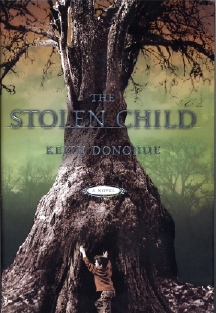 |
 Keith Donohue
Keith Donohue
The Stolen Child
Reviewed by: Rick Kleffel © 2006
Nan A. Talese / Doubleday / Random House
US First Edition Hardcover
ISBN 0-385-51616-9
325 Pages; $23.95
Publication Date: 05-09-2006
Date Reviewed: 11-22-06
Index:
Fantasy
General Fiction
Science Fiction
Horror
We create ourselves each day with memories of the past. The version of us that lives and breathes, that goes to work and makes decisions to do one thing and not another, leaves behind each new day an old iteration, and starts the next day anew. But those old selves are hard to grasp, and harder still to hold a conversation with. How might the person you are at this moment, regard the person you will be twenty years hence? How might the you of twenty years ago judge what you have done with the intervening time? We'd like to think we're always getting better, that we've done if not the right thing, then at least the best thing given the choices available. Of course, were we able to speak to the person that was or the person that will be, the result might be rather unexpected.
Rather unexpected only begins to cover 'The Stolen Child', a first novel by Keith Donohue. Gorgeously written and instantly captivating, Donohue spins a classic fantasy trope into powerful and page-turning conversation between a boy and his changeling self. The changeling-boy matures and grows into an adult, while the stolen child remains a child, hiding in the rapidly vanishing wilderness that surrounds the exurbs from which he was snatched. The purity of Donohue's conception is matched by the precision of his language. The result is a compelling novel of change and changelessness, or growth and stagnation, of eternal youth and ephemeral life.
The setup is simple. On a summer's eve in the mid 1940's, Henry Day, a boy of seven angered by his parents, hides in a tree and falls asleep. He's taken by the changelings, who leave one of their own behind in his place. The changeling child grows up as Henry Day, and Henry Day remains an unaged, unaging child. Their stories are told in alternating chapters, beginning with the changeling child: "Don't call me a fairy. We don’t like to be called fairies anymore." We know that they will meet again, this fantasy creature thrust from the forest into exurban America and his childhood self. What will they have to say to one another? Who, in fact, is Henry Day?
Donohue's novel is a smashing success on all levels. It's a page-turning and yet poignant memoir of how America has changed over the last fifty years. As the implanted changeling adjusts to his family and the rigors of life in the so-called Real World, he's able to question everything around him, able to see everything around him with a fresh eye. And the stolen child, now called Aniday, experiences the changes in the landscape and the world around him from the unchanging perspective of a child. He grows wiser, but never matures. By writing the novel in alternating chapters, Donohue keeps the tension high, playing with time and shifting our perspectives. 'The Stolen Child' is a pure pleasure to read as a not-so-simple adventure in America.
Donohue's use of the fantastic is equally impressive. He grounds his changelings in the dirty, filthy realities of an endless camping trip combined with inescapable homelessness. These are the grittiest changelings you’re ever going to read about. He's relentlessly unsentimental, and it makes Aniday's voice a spiky delight. Donohue displays a master's hand at revealing just how all his fantasy works out in unpleasant surroundings of an actual woodland. It's not all hot chocolate and singing round the campfire. In fact there's none of that. There is however a fair amount of sleeping on hard dirt and eating bugs and bark. Donohue's changelings are by no means gossamer-wearing fashion plates.
And while Aniday gets a bit of an overdose of freedom in the forest, Henry Day, once a changeling, now finds himself growing up and soon enough growing old. But like so many of us, he never feels quite right in his skin and Donohue here uses his fantasy trope to examine feelings of inadequacy and being an imposter. Henry Day is a success by many measures, but can never truly feel that he is, in fact, Henry Day.
Donohue's clever plotting and literary constructs are matched at every point by his command of the language. 'The Stolen Child' is the kind of novel that will have readers wishing to read it aloud. It is eloquent and hard-nosed, precise and numinous. His visions of the changes wrought in the American landscape over the last half century will bring many to the point of tears. How often have you seen the forests and playlands of your youth turned into exurban development? Donohue's vision of ageless children and child-like men lets him get under your skin. His language is up to every task he sets it to, and he is clearly an ambitious writer.
'The Stolen Child' is wonder-filled novel that gives the fantasy genre an amazingly fresh new voice. Donohue embraces his fantasy and he grounds his fantasy and he makes it breathtakingly real. We may all feel that we have had our youth stolen, that we have left behind an essential self that would not judge us kindly. Donohue gives us our youth and our age, our world and the unchanging world it hides, in a novel that is every bit as haunting as the mistakes we have made but can never, ever forget.
|
 |
